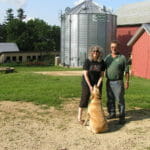Making a Farm Thrive: Deb Tidwell on Farm Legacy
Note: Last time, I posted Jeff Klinge’s Farm Legacy Letter. Now it’s his wife Deb’s turn to offer legacy comments as well.
August 12, 2015
I grew up in the San Francisco Bay area, and this Northeast Iowa farm is very different. Before I met Jeff 22 years ago, I never lived in a place that had so much open space. I always lived in large communities, so I thought Denver (Colorado) was small when I moved to Denver. Then I moved to Tucson and thought, “so now, this is small.” Then I became a professor at the University of Northern Iowa, and Cedar Falls was even smaller. And then I came to Farmersburg and this farm. I get it now–this is truly small. But I liked it. I downsized gradually.
I have developed a love for things like the county fair, which I’d never experienced. For example, if you bake like crazy and bring seven items, you can get a free armband. If you just grab a handful of wildflowers and put them in a vase, you might even get second place. (Laughs.) I also bring to the farm enthusiasm and an amazing appreciation for farmers and this farming life. I’ve watched these professional farmers use a lot of critical thinking to make their farms work. I find that very exciting. I’ve learned so much listening to Jeff and our friend Dan Specht talk about their farms.
I appreciate the longevity of five generations on this farm. When you live on a farm all of your life, it is what it is. But I think I helped Jeff see how amazing it is. There’s such a history here that is just taken for granted.
My top goal for our farmland is to use it to conserve or improve soil, increase biodiversity, improve water quality and other conservation. Without these, nothing else can happen. You cannot farm when your soil has become a biological wasteland, and I’m really getting concerned about the next generation’s water quality.
My secondary goals are to provide a farm for a family to work and to provide land for my farming heirs to farm. I wish these two would go together. It would be ideal to give my heirs an inheritance of equal economic value. All three kids enjoy the farm so much.
Jeff has worked hard his entire life creating this environment where we all can get along. With the children living off the farm, Jeff has pulled this all together because he is family-centered. He talks to the kids (Noah, Elizabeth, and Christina) every week by cell phone or email, whether they are in Phoenix, Des Moines, even Germany. I believe Jeff and I share the importance of family harmony – we work at creating a farm home environment that enables Noah, Elizabeth and Christina to feel connected. We’ve really wanted this farm to be a safe place where the kids can come because it’s their home, too.
I really don’t care if the farmland stays together; it depends on what the kids want to do with it. If the kids want to break it up into four vegetable farms, or if they want to keep the prairie and have this be the home farm when they come, I’m fine with that.
I think Jeff sees this farm as part of a larger community. This farm, the markets and the local community are all connected. Every aspect of the farm is important to him. Even the choices he made that you see right out this window. He chose the right trees and location, and this beautiful canopy that has developed over 25 years is the result. It cools the house, which lowers energy costs, but it also provides habitat for the birds. You walk out in our yard, and it’s a cacophony of noise in the morning. It makes for a very pleasant homestead.
I like the idea of a presumption of competence. When you get challenges, you just presume that you can solve the challenges. It’s just a matter of finding the right path. It might take five years but we can get there. Like this giant ragweed problem. We’re going to get it under control.
Before we finish the interview, I want to say that instead of Jeff being remembered as the guy with the ragweed problem, I’d like him to be remembered as the guy that really did appreciate land not just because of what it did for him, but what he did for it. He not only survived on this farm, he made it thrive.
–Deb Tidwell
Farmersburg, Iowa

